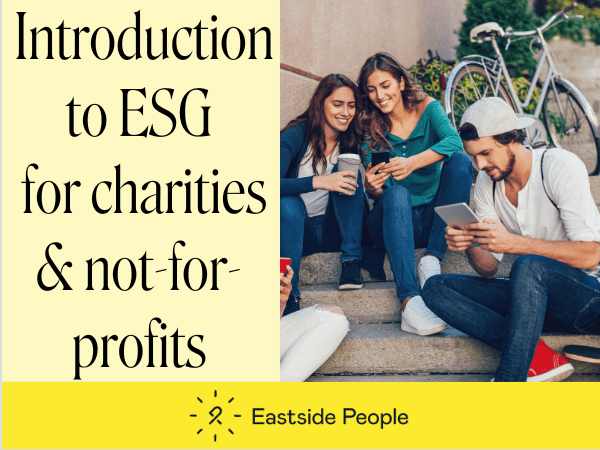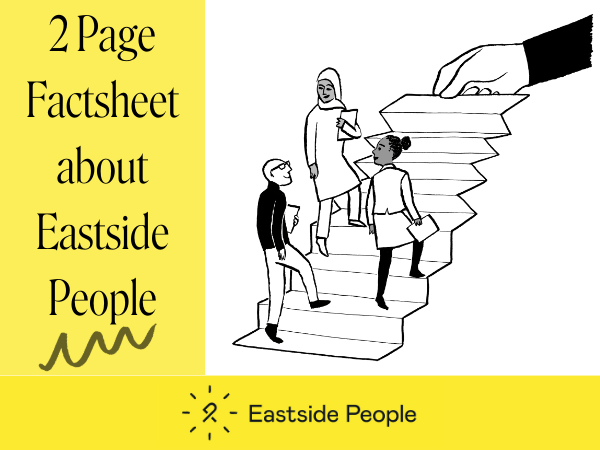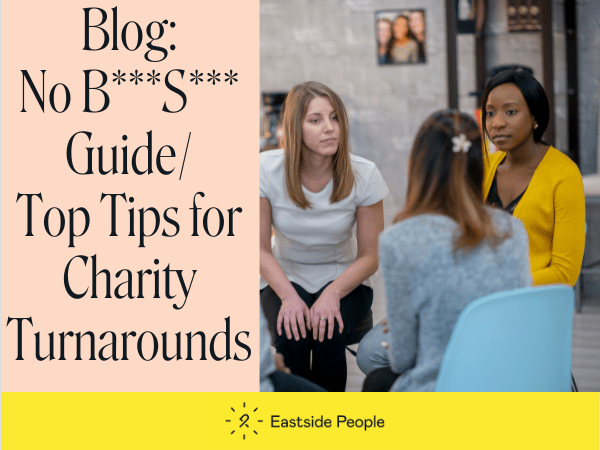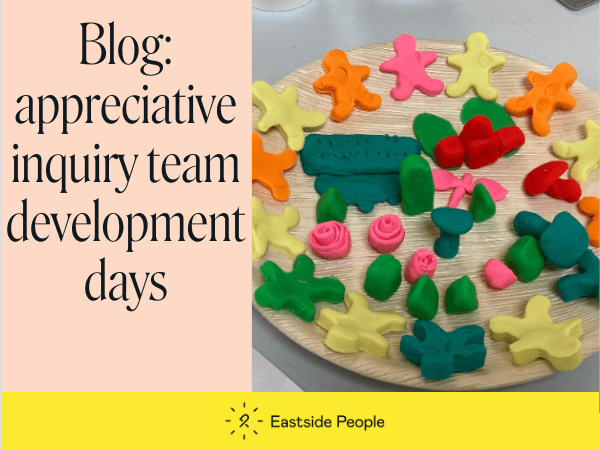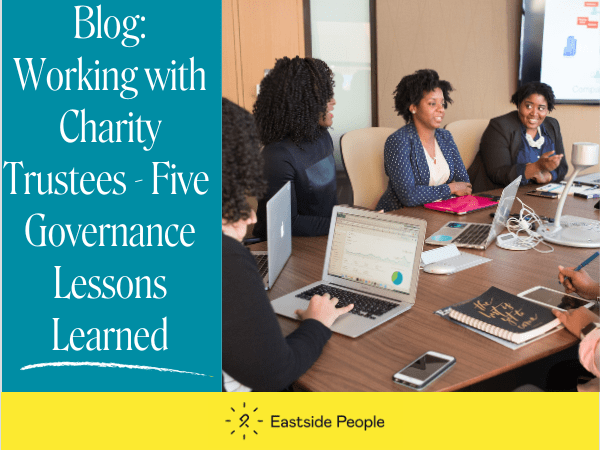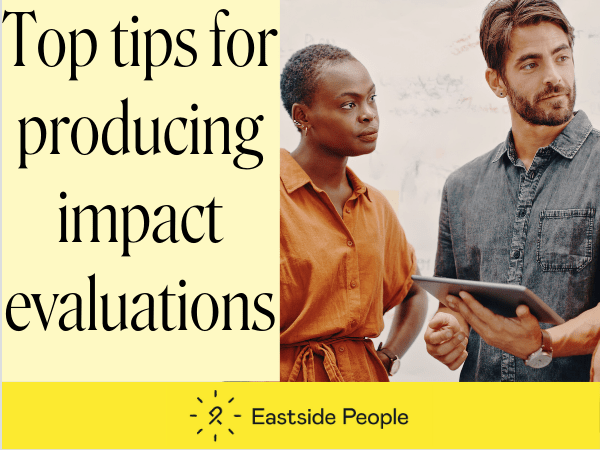UK’s First Charity ESG Survey: Sector Keen to Engage, Prioritizes Social and Governance Over Environmental Issues
Analysis of Eastside People’s first Environmental, Social and Governance (ESG) survey (supported by partner ACEVO) has found that most organisations (67%) do not yet have a ESG strategy, and very few have a holistic, fully integrated strategy (3%).
Almost half (42%) of participating organisations are ‘considering developing’ an ESG strategy, indicating that they are engaged with ESG as a concept, but have not yet defined what it means for their organisation.
The most significant gap between importance and progress ratings across the whole survey was in the area of Equality, Diversity and Inclusion (EDI). While 99% of organisations said that embedding EDI across their organisation was either ‘very important’ (82%) or ‘important’ (17%), over half (56%) rated their progress in this area as still at the ‘starting out’ or ‘developing’ stage.
The good news is that nearly three-quarters (74%) of organisations are currently paying the Real Living Wage, but a significant minority (26%) are not able to do this.
Progress on Environmental issues is lagging behind Social and Governance in all cases Only 10% rated themselves as ‘advancing’ or ‘advanced’ in monitoring and taking steps to address the negative environmental impact (real or potential) of their activities and services.
In addition, only 16% rated themselves as ‘advancing’ or ‘advanced’ in monitoring and taking steps to address the negative environmental impact (real or potential) of their assets and resources (i.e. buildings) with just under one third (32%) doing any form of carbon footprint measurement compared to 52% in the private sector*2. Moreover, a smaller group still of just 15% have a net zero plan.
As expected, Governance was the area of ESG where charities were most advanced, although organisations still have work to meet best practice and align with the Charity Governance Code.
When looking at trustee boards, only 48% of large organisations (income >£1m) had undertaken an independent review of board effectiveness in the last 3 years, despite this being recommended practice under the Charity Governance Code
Furthermore, 37% of these larger organisations had at least 1 Trustee who had served more than the recommended maximum tenure of 9 years. This issue seems to be compounded in small organisations who we surmise have access to smaller pools of candidates, and therefore find it harder to recruit for diverse boards.
Results also found that organisations are struggling to effectively measure and evidence their impact on their beneficiaries and the wider community. While most (75%), said it was ‘very important’ for them to gather evidence on the difference they make to their beneficiaries, relatively few (17%) rated their progress in this area as advanced.
With 96% of respondents agreeing that having a theory of change for how they make an impact, how they achieve it and why they’re confident this is the best approach is very important or important, it is striking that only 22% have a published current theory of change or similar.
Eastside People’s tool is unique in that it enables individual charities and not-for-profit organisations to input their own ESG data and receive individual and comparative feedback about their progress.
The annual reporting tool (which was open for completion by charities and social enterprise across the UK in September and October 2024),*1 complements existing ESG frameworks and standards and aims to be a starting point for more collaboration, peer-support and shared learning across the sector.
The organisations completing the tool spanned a variety of cause areas with services from health and social care to conservation, arts and heritage, education, sports and leisure, homelessness and supported housing.
Quotes:
“As we are beginning the process of trying to develop our approach to ESG, it seemed like this survey might spark some interesting trains of thought and provide insight into the most effective and appropriate ways that we can evolve our approach to ESG.” Kerry Gray Operations Manager, Cardiac Risk in the Young.
“We wanted to undertake the survey to reflect on our performance as a charity in relation to ESG, to access benchmarked data and obtain examples of good practice.” Alison Taylor, Chief Executive, Carers First.
“We found frameworks for assessing where we were on ESG matters didn’t fit well for a charity (e.g. B Corp is just “not for charities”), so we were pleased to have something relevant that guided self-assessment.” Dan Oaker, Deputy Director – Finance & Resources, National Children’s Bureau.
“We developed the ESG Survey tool and made it completely free of charge to use because we feel very strongly that charities and social enterprises should be able to review and reflect on their environmental footprint, social impact and governance practices, regardless of their size or budget in a social sector context” said Richard Litchfield, CEO Eastside People. Our first results have provided a benchmark for the sector but show clearly that there is much more to do. Our intention is for the ESG Survey to provide annual sector-wide analysis for more and more organisations, delivering more knowledge and insight year on year.”
“Developing understanding and taking action on ESG is an important part of chief executives’ and senior leaders’ roles both for strategic planning and day-to-day operations, to optimise governance, enhance contribution to the goals of society and minimise environmental impact for the causes and communities their organisations serve.” said Jane Ide, chief executive, ACEVO.
“We welcome the availability of a free tool that can be used by all charitable organisations and their leaders to understand, assess and optimise their ESG goals and are proud to work with Eastside People to raise awareness of the tool and its benefits so as to support leaders to make the biggest possible difference”
“Feedback from our members is that ESG is becoming an increasingly important part of their day-to-day operations, to optimise their governance, enhance their contribution to the goals of society and minimise their environmental impact.” said Jane Ide, chief executive, ACEVO. We welcome the availability of a free tool that can be used by all charitable organisations to understand, assess and optimise their ESG goals and look forward to working with Eastside People to raise awareness of the tool and its benefits.”
Read what the charity press had to say about the charity ESG research
- Civil Society: : Most charities do not measure their carbon footprint research finds
- Charity Times: One-in-four-charities-have-no-global-majority-leaders according to latest research
- Pioneers Post: DEI under threat. Can it hide in plain sight?
- Third Sector: Research finds that two thirds of charities have no environmental social governance strategy
Hear our CEO Richard Litchfield speaking to Lucinda Rouse and Andy Ricketts on the Third Sector podcast about our research into charities’ approach to environmental, social, governance strategy. Richard speaks of the importance of ESG in reinforcing public trust for charities, as well as measuring social and environmental credentials for corporate partners in the face of tightening ESG regulations on businesses.
The next round of the Eastside People ESG survey is open for completion between Tuesday 27th May 2025 and Friday 25th July 2025.
Sign Up for the 2025 ESG Survey
Read the 2024 ESG Survey Report:
Download 2024 ESG Survey Report
Discover Eastside People’s ESG consultancy services or get in touch today.



